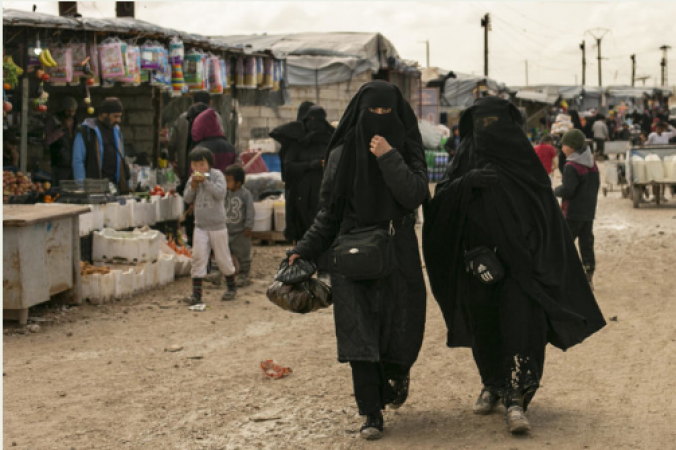
Baghdad: Iraq has intensified its repatriation efforts from the al-Hol camp in northeastern Syria, where thousands of suspected Islamic State (IS) militants and their families are residing.
The primary goal is to reduce the threat of militancy and address the overcrowded and unsanitary conditions at the camp. Al-Hol houses approximately 56,000 individuals, with 28,000 of them being Iraqi nationals.
Also Read: Migrants on Italian Island Clash with Police in Housing Protest
Repatriating Iraqis from al-Hol has posed several challenges, including:
Security Concerns: There are concerns that some returnees may still be radicalized or pose a security threat. Screening and identifying those who may have been involved with IS require meticulous procedures.
Overcrowding and Unsanitary Conditions: The camp's overcrowded and unsanitary conditions make it imperative for Iraq to expedite repatriations. Al-Hol's infrastructure struggles to support such a large population, leading to humanitarian and health issues.
Complex Reintegration: Successfully reintegrating returnees into Iraqi society is complex. These individuals often come from backgrounds deeply affected by IS and may require extensive support in terms of rehabilitation, psychological assistance, and socioeconomic opportunities.
Iraq's Commitment and Progress: Despite these challenges, Iraq remains committed to repatriating its nationals. The government has made notable progress by bringing back over 1,000 Iraqis from al-Hol since the start of the year. Iraqi authorities aim to ensure that the returnees undergo thorough screening processes and receive the necessary support for reintegration.
Countering the IS Threat: The repatriation efforts are part of Iraq's broader strategy to counter the ongoing threat posed by IS. While the group has suffered significant military defeats, it still maintains a presence in remote areas of the country. The fear is that it could regroup and launch new attacks. Repatriating Iraqis from al-Hol not only addresses security concerns within the camp but also contributes to Iraq's national security by mitigating the potential resurgence of IS.
Families Reunited and Lives Rebuilt: The return of Iraqis from al-Hol holds profound significance for many families who have endured separation since IS took control of parts of Iraq in 2014. Reuniting these families allows them to start the process of rebuilding their lives, healing emotional wounds, and restoring a sense of normalcy.
Also Read: China's Defense Minister Li Shangfu Disappears Amidst Investigation Rumors
While the repatriation process is undeniably challenging, the Iraqi government remains steadfast in its determination to see it through. Authorities believe that, with proper support, the returnees can be rehabilitated and reintegrated into society. This endeavor also underscores Iraq's commitment to addressing the IS threat comprehensively and demonstrates its seriousness in taking proactive measures to safeguard national security.
Iraq's stepped-up efforts to repatriate its nationals from al-Hol are a significant response to the multifaceted challenges posed by the camp.
The government's commitment to ensuring the safe return of its citizens, coupled with comprehensive screening and reintegration efforts, not only addresses the urgent humanitarian situation at al-Hol but also contributes to Iraq's national security by countering the threat of IS. It serves as a testament to Iraq's resolve in tackling these pressing issues head-on.
1. A Sensitive but Necessary Responsibility: The Iraqi government acknowledges the sensitivity of repatriating its nationals from al-Hol. Still, it asserts its responsibility to bring them home, recognizing that addressing their plight is a moral obligation.
2. Part of a Broader Anti-IS Strategy: The intensified repatriation efforts are integral to Iraq's comprehensive strategy for countering the threat posed by IS. By addressing the situation at al-Hol, Iraq aims to mitigate the potential resurgence of IS within its borders.
3. Reuniting Families Separated Since 2014: Many Iraqi families have endured separation since 2014 when IS took control of parts of the country. The repatriations provide an opportunity for these families to reunite, heal emotional wounds, and begin rebuilding their lives.
4. Rehabilitation and Reintegration: Iraq's commitment extends beyond repatriation; it includes the challenging process of rehabilitating and reintegrating returnees into society. Providing necessary support in terms of rehabilitation, psychological assistance, and socioeconomic opportunities is a key component of this effort.
5. A Demonstrated Commitment to National Security: The repatriations underscore Iraq's seriousness in addressing the IS threat. By taking proactive measures to repatriate its citizens from al-Hol, Iraq sends a clear message that it is committed to safeguarding national security and preventing the resurgence of extremist groups.
In summary, Iraq's intensified efforts to repatriate its nationals from al-Hol are not only a response to a pressing humanitarian situation but also an essential component of the country's broader strategy to counter the threat of IS.
Also Read: Kremlin Labels Businessmen Seeking Sanctions Relief Through Criticism 'Traitors'
The government's commitment to the safe return, rehabilitation, and reintegration of its citizens demonstrates its dedication to addressing the multifaceted challenges posed by extremism and its enduring resolve to ensure national security.